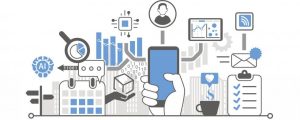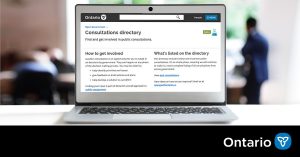A new round of public consultations about our province’s digital and data strategy opens up this week, following the release of a third discussion paper about living and working in our data-driven society. The public can learn about key digital and data issues, make recommendations and provide advice on the government’s implementation efforts.
As such, public participation is important to all of us.

The Ontario government’s development of its Digital and Data Strategy is in fact already well underway. Ontario Digital Services image
However, the Ontario government’s development of its Digital and Data Strategy is in fact already well underway: it has already enshrined into law the role of a Chief Digital and Data Officer for the province. There is a new Digital Service Standard with more than a dozen formal guidance points in place about the delivery of online data-driven services.
And as of August 6, the Simpler, Faster, Better Services Act outlines how the government delivers programs and services to the people and businesses of Ontario.
Concurrent with the current strategic development and related public consultation activities continue, members of the government’s Digital and Data Task Force have been appointed.
It’s all designed to lead to the release of final Data Strategy by the end of this year. The process is moving very fast for such an important topic, observers and participants say, full as it is of ramifications for many aspects of our social, economic and political lives.
Nevertheless, the government says that during its public consultation and roundtable discussion period, people will have the opportunity to have focused, in-depth conversations on the topics covered in the discussion papers, including the need to ensure public trust and confidence in the data economy, how to unlock the value of government data and how to enable Ontario companies to develop data-driven business models.

Public roundtable discussions about Ontario’s Digital and Data Strategy begin this week. Ontario Digital Services image
Afternoon roundtable discussions begin this Friday, November 1 in Stratford; events in Ottawa, Peterborough, Sarnia and Sault Ste. Marie follow on November 5, 8, 12 and 15.
Online comments are also encouraged and they can be posted at engage.ontario.ca.
The pace of strategic development mirrors the unprecedented growth in data use and fast-evolving capabilities of technologies deployed in virtually every industry. Widespread innovation, giving rise to hundreds of new enterprises and helping established businesses create new markets, is driving innovation and improving operations across the economy.
The risks presented by this unprecedented technological growth are just as apparent and fast-moving. As such, increased protections for citizen’s digital rights are necessary and the ability of governments to use legislation to ensure safe data practices and privacy compliance must be strengthened.
Under Ontario’s current privacy laws, the provincial government can collect, use and share personal information for legitimate, limited and specific purposes and it must inform individuals about how it intends to use their personal information.

In Ontario, 23 ministries and numerous agencies collect data as part of their program and service offerings. ODS graphic
But the government says such rules and regulations can create barriers to productive data sharing. In Ontario, 23 ministries and numerous agencies collect and manage vast amounts of data as part of their program and service delivery. Doing so more efficiently and effectively can save money and increase service delivery, the government says.
So new proposals and operational amendments can allow government agencies to establish data integration units that will have the ability to collect, compile, and analyze government data for purposes such as the planning and evaluation of programs and services. The changes also include rules for the collection, disclosure, and de-identification of information. Further, the Simpler, Faster, Better Services Act promotes data sharing across ministries.
The government has committed to share more of its data, following the principle that all government data should be made open unless it needs to be protected for privacy or legal reasons. To date, at least 750 government datasets have been made open on Ontario’s Data Catalogue at Ontario.ca/data. In 2018, there were approximately 20,000 downloads of open datasets every month from the catalogue.
(The openness of open data means anyone can work with the materials to create any application they so desire. But that same openness leaves open the door of on-going responsibility or accountability for the application and the data being used. One case in point is a web page that provides information about Toronto’s city councillors, but the site is very dated – it still lists as a sitting councillor someone who passed away more than a year ago! The site is now hosted by a digital data company called Tableau. A representative for Tableau says the web page and its information “are a gift to the world”, and that the company does not “monitor/manage anyone”, nor will it “update/delete anything”. A noble stance, perhaps, but it means dated and misleading information is widely available.)

The public should have input on key digital and data issues, make recommendations and provide advice on the government’s digital strategy implementation efforts. ODS image.
At these latest public consultations and through the government’s online consultation and comment page — open for comment until the end of November — Ontarians can share their thoughts about how better data management, data skills and data sharing across government can improve outcomes for the people, businesses and communities of Ontario.
It is an opportunity for citizens to share their thoughts about how provincial ministries should collect, analyze and share data. Standards for the collecting, linking, de-identifying, retaining and disposing of personal information can be discussed and established. The public can learn about key digital and data issues, make recommendations and provide advice on the government’s implementation efforts.
Even so, the survey posted in the first phase of consultation garnered just 770 replies (of which just 45% were deemed to be “from the public” as opposed to government or industry).
Yes, the government is consulting, but one wonders with whom? Toronto itself is said to have more than 228,000 workers in the high tech sector: we should all be participating in the consultations, and providing input to guide our shared digital future.
-30-
a highly educated workforce, strong academic research institutions, and a diverse and stable economy



